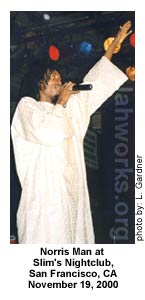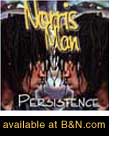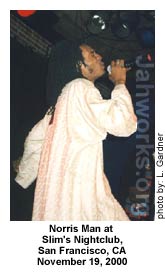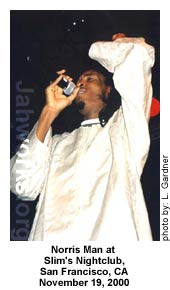 Norris Man walks into a room and you feel his energy. The type of energy that A&R reps call “it.” The “it” that packages chiseled looks, talent, youthful exuberance, and fervent spirituality. His energy acts as a magnet, drawing people towards him, hanging on his every word as if he were the wise sage just down from the mountain. Although his face displays a youthful innocence, the combination of curiosity, life experience and hardship smolders underneath the surface. Born in the Kingston ghetto of Trenchtown as Christopher Campbell, Norris Man has had a hard journey, but has persevered. For the 27-year old, the “it” has been a long time coming.
Norris Man walks into a room and you feel his energy. The type of energy that A&R reps call “it.” The “it” that packages chiseled looks, talent, youthful exuberance, and fervent spirituality. His energy acts as a magnet, drawing people towards him, hanging on his every word as if he were the wise sage just down from the mountain. Although his face displays a youthful innocence, the combination of curiosity, life experience and hardship smolders underneath the surface. Born in the Kingston ghetto of Trenchtown as Christopher Campbell, Norris Man has had a hard journey, but has persevered. For the 27-year old, the “it” has been a long time coming.
Realizing at a young age that he enjoyed singing, Norris Man started out by frequenting sound systems like Stacks International, Bionic Steve, and 007 in his home town of Kingston. Eventually he started to record, but came across many obstacles: so-called allies who would withhold his earnings, scarce radio play of his songs, and even a physical attack.
 In 1995 he met up with the producers of his 1997 hit single, “Persistence” and his 2000 full-length album release of the same name [VP Records]. He sings powerful songs in the “sing-jay” style a la Sizzla and Buju Banton. However, the one criticism that surfaced surrounding the album was his need to give his tunes a slightly harder edge.
In 1995 he met up with the producers of his 1997 hit single, “Persistence” and his 2000 full-length album release of the same name [VP Records]. He sings powerful songs in the “sing-jay” style a la Sizzla and Buju Banton. However, the one criticism that surfaced surrounding the album was his need to give his tunes a slightly harder edge.
He has just finished a new album entitled “Better Your Soul,” produced by Colin McGregor, which will be released in the spring of 2001.
 Norris Man gave an excellent performance in San Francisco at Slim’s Nightclub on November 19th, 2000. His disposition on stage struck me as a cross between Anthony B and Bob Marley. Not only are Norris Man’s locks reminiscent of Bob Marley’s “Rastaman Vibration” period, but his spiritual fervor and clearly articulated lyrics also follow in the Marley tradition. His rapid-fire dancehall sequences were comparable to Anthony B’s.
Norris Man gave an excellent performance in San Francisco at Slim’s Nightclub on November 19th, 2000. His disposition on stage struck me as a cross between Anthony B and Bob Marley. Not only are Norris Man’s locks reminiscent of Bob Marley’s “Rastaman Vibration” period, but his spiritual fervor and clearly articulated lyrics also follow in the Marley tradition. His rapid-fire dancehall sequences were comparable to Anthony B’s.
Our interview took place before his performance. In his thick patois, Norris Man discussed his career and musical influences in addition to hot topics such as race, gender and faith. Although we didn’t always see eye to eye, I went away with a little deeper understanding of his beliefs. What follows is a transcript of our conversation (Norris Man’s words were translated from patois for clarity):
Laura Gardner: What was it like growing up in Jamaica singing at a young age?
Norris Man: Blessed love. Rastafari. Give thanks. Well, it was like I wouldn’t say a dream, but something that you vision and when it really comes to pass, it’s wonderful. Back in those days, I wasn’t working for this yet. I had the hope but it was not yet seen. The only encouragement I had in those times were the youths around me in my ghetto area, Trenchtown, where I was born. You have sound systems in the area that would play on weekends-Friday and Saturday nights-and I would go around and toast on the riddims. True, I was very small at that time. They usually put me up on this Guinness box and I would chant a few songs, you know?
My first talent that I really gathered was to sing and when I started singing, the DJ vibes went in and it was always a mixture and they said, “you have a nice flavor and a nice style.” So, from that, they always saw me as an original artist: my melodies, my style and my creativity. In those days, to be considered professional, you would have to be known as a DJ riding the Studio One riddims because those riddims have timing and you have to have timing. I came up on those riddims, practicing them as a likkle youth.
 When I reached the age of say 22-23, I started voicing songs. The first 45 I voiced was for a label called the Arabic label, and I voiced my second song for G.G. Records. Buju Banton has a studio called Cellblock 3-2-1 where we worked with his brethren. I voiced my fourth song there and that is when I met Richard Bell from Star Trail Records and Anthony B. I met my producer in 1995 who would later release my album “Persistence.” We worked from there and in 1997 I launched my hit song in Jamaica, “Persistence.” That is where it all began and it leads me to this day where I now am in California doing shows!
When I reached the age of say 22-23, I started voicing songs. The first 45 I voiced was for a label called the Arabic label, and I voiced my second song for G.G. Records. Buju Banton has a studio called Cellblock 3-2-1 where we worked with his brethren. I voiced my fourth song there and that is when I met Richard Bell from Star Trail Records and Anthony B. I met my producer in 1995 who would later release my album “Persistence.” We worked from there and in 1997 I launched my hit song in Jamaica, “Persistence.” That is where it all began and it leads me to this day where I now am in California doing shows!
LG: I’ve heard that you’ve gone through plenty of tribulation on your road to get here. What have you learned from the hardships, and now the blessings?
NM: When I went out on the road for my first tour, they told me I’d get work but I wouldn’t get any pay. I was just going out there to gather experience and get some fans’ attention. Well, sometimes you have to think of things two-way, you know?
First I knew it was going to be hard because of my welfare and my bills. I have kids I had to support. And it would be very hard to be out of my country for one month. So what I did whenever I had time after [a performance] was I went out on the street and I would do dubplates and specials for DJs. I would achieve a little pocket money that way. And I would save my per diem and be more economical. That’s how I really started out.
My second round on the road, I had gained some more recognition where people needed me to do shows, so they would pay their money up front. I am glad to know that I got the experience to travel all around the world. The work that we do takes us to many places.
LG: Yes, I heard that you just returned from Gambia in Africa.
NM: Yes, we first landed in Senegal. Then we drove around for 15 hours and reached the part where you had to take a ferry, where we then entered over into Gambia. It was a wonderful experience getting to know the motherland where I’n’I descendents are from. It’s good to go back to the land where I’n’I was created.
LG: Did you feel a kinship with the people there?
NM: Yes, well, the first thing you can feel from the people is that their meditation is like us. They act like us. They are very smart and clever like us. So we know that we have something in common there.
One thing I see with them that many of us don’t have is something called love. Whenever we come, we can’t get any time for ourselves. Someone wants to carry a bag. Someone wants to get you some food. You get so much assistance. The supporters of the music were plenty, massive. When we went to the stadium, people were jumping fences and rushing in. It was really an experience, even though it was a danger cause they were lifting up cars and everyone wanted to come inside. I see that the people of I’n’I kind are really showing love. But I see the good and I also see the bad.
The bad thing I saw that upset me (and I think I should really utter out words and words of thunder and lightening) was when I went to Gambia, I saw that they give the people newspaper to wrap their bread and their food. I’m saying no, we don’t see what the United Nations is doing. There are parts of Africa where the English came and the Americans came and they built big resorts and hotels and they’re investing and they accommodate their people, yet still they see not the plight of the youths-their sufferation. They don’t see that.
I’ll always say that America is the mother of all countries. It is a country that everyone looks upon and has a dream to come. Yet still, they help not the poor-they invest in military, nuclear power and all these things. So much food in America wasting. Are we going to sit aside and see someone else suffer and die? We don’t understand what the United Nations is and what it represents.
LG: I was reading somewhere that there’s enough food in the world to feed everyone three times over three times a day. But it’s the distribution that’s faulty.
NM: And you can see that clearly. Now imagine, you go into a store in America and you want to buy an apple. You see seven different apples from which to choose from. And it’s always full. Nothing sells off. So, we know that.
They can more than assist the Ethiopians, the children in Ghana, the children in Nigeria, the children in Ethiopia, Gambia, Senegal, Malawi. Something needs to be done. We as black people, superstars and members of religious denominations and philosophies, we in high places and who can afford it, pack a little bag. Let’s do something-send an envelope, get something to them. So many clothes wasting. So many living big, yet someone around the corner cannot even find a night dinner.
LG: That’s leading into another question I had. What can you do as an artist with exposure to ease poverty and improve people’s quality of life?
NM: To tell you the truth, where an individual is concerned, it’s very hard. But we use the songs that we make and the music that we sing. We’re trying to open a new entity at our shows where during Black History Month, we try to emphasize Africa, and express the feelings and experiences of Africans-their condition. For right now, we are really doing teamwork with artists from Jamaica. We are planning to go to Africa and do shows. Whatever money we accumulate, we will try to use it to build a little community centered in Gambia, so that our name and our work can live on. If we’re going to make Africa be the Africa, we’ve got to organize and centralize and that is the word of His Imperial Majesty.
LG: I had a good reasoning with Anthony B last time he was in town about issues of race-about helping your people first yet where do you draw the line? And are we all in this together or are you for you and me for me?
NM: Well, it’s just simple this: We see every race, every class and every creed not inferior or superior to us, but as one. Yet still, we have to uplift our blackness because black people are the only people in the world that don’t get their recompensation. They don’t have a place where they can go back. Remember that the man from Japan can go back to Japan anytime. It’s there for him. You’re born, you live in America, maybe you can go down south, you can go to up north, you can go to L.A., you can go to New York, and you have places you can go in America.
Now we are from Ethiopia. What we see so far is that Ethiopia has been raped. For us to go back to Ethiopia, we’re going back to more famine, more destruction because the place is not developed. We are not getting any help. So what we are saying when we uplift the blackness is that black people from all parts of the world must remember their roots and where they’re coming from and put an aim unto Africa. The Chinese man tells you about Buddha, the Indian tells you about the Hindus. It’s simply showing self-reliance and we as black people must build for ourselves. Do things for ourselves. We won’t have the Africa that we want to see until we see ourselves not only as individuals, but as a group and family trying to make this possible.
As I say again, His Majesty tells about organization and centralization. We can’t go to the white man and tell him about our culture and the help that we need. We’ve got to have an entity to ourselves and then we can involve others. Not only to come to Africa, but to invest and do business to help Africa be Africa.
Remember that the United States is giving all nations privilege to come to your country. What do you think is the reason is for that? Because you can come and work and build America. When the Chinese man comes to America, he’s now Chinese-American. Same with the Indian. So when he comes to America, he builds America and he works, he pays taxes. That’s better for the country. With Ethiopia, it is not so.
LG: I’m not entirely convinced that there’s a need for everyone to go back to his or her homeland. Why don’t you build that community that you’re talking about here? Or in Jamaica?
NM: You couldn’t make that decision because if a man says to himself that he wants to know the land where his nation is from, he has the right to go.
LG: Certainly.
NM: If someone tells you that you were born in Germany, I know that you would want to go to Germany some day. You may not go to live there forever, yet still you’d want to go. And even though you might not go to live, you’d still want to know that whenever you go to that place, it’s a place where you can go and feel comfortable-not see sufferation, not see plights and exploitation. You want to see a wonderful place.
LG: Going back to the music, can you tell me who has been a great influence on your sound?
NM: Well, it could be a couple of artists. I would say my main mentor is Bob Marley. Not in regard to his singing or styles but his lifestyle and the way he did things. He was also a man who foresighted things before their time and showed us within the music, but some people just recognized that after he passed away. So it was that of Bob that really keeps I’n’I strong. He was a man who put out so many works, yet still didn’t get the recognition in his own country. And in the world today, Bob Marley is the Man of the Century.
LG: How do you see the Bob Marley/Peter Tosh rivalry?
NM: There’s a difference between the two. Bob Marley and Peter Tosh are two totally different persons. We’re not saying that none is stupid, none is this or that. Bob Marley had to reach out to the world to get his message across. Peter Tosh saw it where he wanted to bring the people into the country because they would bring the currency. So that was really the difference.
Bob Marley started to fly out, going around the place, England, Europe, before Peter. But yet still everyone came back and did the same thing-they all flew.
LG: Why do you think there aren’t more conscious female dancehall performers around?
NM: I would say we don’t see so many female artists within the righteous part of the music because we put the responsibility on the men. Whenever you have a woman, no matter what, she must be living with a knowledge and understanding of Rastafari and the teachings of the way of life. You can’t just be having her around and she not getting something of your culture. She must have something where she can go out and tell her friend.
For me, I always tell a woman her values. I let her know that nothing must come around her dignity. We know that the world is of many things, and the influences on certain men and women define their way of life. So, if a woman is around me, she has to be positive. The teaching and the lifestyle you’ll adopt will be the same as the lifestyle of the people you’re with and the same as the people in the world today.
LG: So you’re saying it’s a male influence.
NM: It has to be a male influence. I will give you an example: you are in the gangsta world. The gansta boys have gangsta girls. If she comes in the gangsta world as a girl who is not a gangsta, she has to become a gangsta because her man is a gangsta-her boyfriend is a gangsta. Now if a woman meets you and you are a Rasta, she may not carry the locks, but she’s going to change daily. She is going to see that what you are doing is not fake. You are living it and she loves you so she’s going to try to live in the most positive way to show you that she’s trying.
LG: Do you think she can live positively without a man being there?
NM: Well to me, give thanks to the woman who can live without her man and be strong, but it’s very rare. I can tell you that. Even the Bible say, “A woman cannot seek the Kingdom of Heaven without a man by her side.” So how can a woman live without a man? She can’t be going back to her grave and not have a kid. Because remember, it’s King Alpha and Queen Omega. It’s a female and a male.
When a woman lives alone, maybe she’s searching in her heart, but if she was to go back the way she was then, she wouldn’t be doing something good. To me, we’ve got to multiply. We need to leave back something.
I couldn’t be in the world today and not have a kid. Whatever I was taught, I have to pass it on because I’m doing a work and it has to go on, so you’ve got to have offspring.
LG: We have a saying, “Behind every man is a strong woman,” which is a spin on what you were saying.
NM: That’s also true. It represents that. Because remember: how can a woman have a positive man and not be strong? She’s got to be strong because the man is going to show her the ropes. The man is going to tell her, “Men are like this…” She would have a clear knowledge of what’s going on.
LG: Do you think there won’t ever be many conscious female artists because of this?
NM: Right now, conscious female artists are out there, but as I say, you will find that the majority are men. The men have to take up that responsibility. When most men have women around them without their intimate partners or friends around, they tend not to teach them about the positive side of life. If a woman looks attractive, men are more likely to reason upon sex and just that. She doesn’t leave the man with something positive in her head, saying, “I was taught this,” and “I was taught that.”
LG: What are you most proud of in your life so far?
NM: It’s a good question and it could be a simple answer because the thing I am most proud of right now is that I have health and strength. Trust me. If I was to say the nice things in my life, there are a lot of nice things in my life: my friends, the new people that I meet, the experience that I have now from I have then, knowing that I can live in a house and lay my head down in my own place, I have my car, I am living a life, I get my kids… But the thing I am most proud of right now is knowing that I can get up right now and know that I am physical. I am not sick or anything. I’m healthy. And giving thanks. I give thanks to His Imperial Majesty, Emperor Haile Selassie I. Jah Rastafari. He’s the one that carries me through.
LG: Tell me a little bit about some of the projects you have going on right now.
NM: My latest project is my album called “Better Your Soul,” soon to be released in February or March. A friend I have here in San Francisco worked on the album. We started about a year ago now. It’s just completed.
LG: Lastly, if you could only have one message in your music, which message would that be?
NM: Well, this is a universal message telling the youths to stay far from drugs.
Be more educated in this time because there are so many things around you. You can’t just pass a sign every morning and not read it to find out what is it all about. You can’t be blindly going into things. Check it out first.
Always be positive. Always have something good to tell a friend or neighbor and we must always remember that no matter where we’re from, no matter who we pray to, whether we pray in a mass, whether we pray under a window, whether we pray in our bathroom, just give a prayer, you know? Yeah mon, and Jah will answer.
Copyright ©2000, Laura Gardner. All Rights Reserved.





